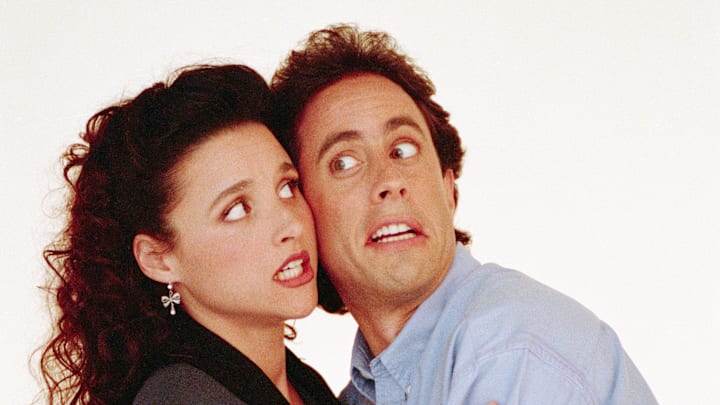“Like a full body dry heave” is how George Costanza described Elaine Benes’s awkward dance moves during a work function in “The Little Kicks,” a 1996 episode of Seinfeld. The sequence, which horrifies spectators, is a marvel of physical comedy thanks to Julia Louis-Dreyfus. Elaine, oblivious to her total lack of rhythm, seizes and gyrates like a gangster being shot down in a 1940s B movie.
That nugget of an idea—a person completely unselfconscious about their frenzied dancing—actually originated with a real person who worked for NBC: Lorne Michaels, stories creator of the long-running Saturday Night Live.
According to Seinfeld writer Spike Feresten, who penned “The Little Kicks,” the idea for the segment came when he was working as a receptionist on SNL. Speaking with author Jennifer Keishin Armstrong for Seinfeldia: How a Show About Nothing Changed Everything, Feresten related that he observed Michaels dancing at an SNL after-party one night and was mesmerized at how bad Michaels was.
Michaels, Armstrong wrote, “was dancing as if he’d never seen another human dance before.” He “heaved and gyrated” to a beat “only he could feel.”
The idea made it through the gauntlet at Seinfeld, a production famous for being rather discriminating when it came to plotting episodes. And while Feresten said he demonstrated some of Michael’s moves for Louis-Dreyfus, the actress worked on them at length herself, even demonstrating them for her family. When they were deemed sufficiently terrible, she performed them during filming.
The dance has since taken on cult status. Each year, the minor league Brooklyn Cyclones host a Elaine Dance Contest in which spectators are invited to give it their best. (Or, more accurately, their worst.) The winner receives a trophy, though none have yet to replicate the streak of Louis-Dreyfus: She’s an 11-time Emmy winner, though only one of them was for Seinfeld.
